NewsBrief, 18-24 November 2014
- Transitional government assumes power in Burkina Faso
- Ousted Burkina Faso President Blaise Compaoré travels to Morocco
- WHO: Ebola cases levelling off in Guinea and Liberia
- RPCA: Food security expets forecast above average grains production in 2014-15
- Mali: Third round of peace talks opens in Algeria
- ECOWAS and UEMOA review progress on institutional co-operation
- Contact Group urges strong international support for Guinea-Bissau
- ECOWAS/RAAF seeks proposals for social safety net study
Transitional government assumes power in Burkina Faso
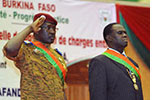 Michel Kafando vowed not to repeat the mistakes of his predecessor as he assumed the powers of interim president in Burkina Faso. "We must always respect the Constitution with humility because the power that I hold is that of the people," Kafando said shortly after taking the oath of office. The former foreign affairs minister and UN ambassador was inaugurated on 21 November, in a ceremony attended by the president of the ECOWAS Commission and heads of state from several West African countries. Following a moment of silence in honour of those killed in the popular uprising that drove longtime president Blaise Compaoré from power, Kafando vowed to uphold the will of the people and respect democratic institutions. "This revolution is but the result of a social exasperation in the face of flagrant injustice, nepotism and the impunity of corruption", he said. "The message from the people is clear, and we have heard it." The ceremony marked the official transfer of power from the military to a civilian-led government. In one of his first official acts, Kafando named Lieutenant Colonel Isaac Yacouba Zida to serve as prime minister in the transitional government. Zida was installed by the army as head of state shortly after Compaoré's departure but agreed, under intense domestic and international pressure, to hand over power to a civilian authority. Zida unveiled a 26-member cabinet, retaining the post of defence minister for himself while assigning the role of foreign minister to the interim president. With military officers appointed to several key ministries, some civil society representatives expressed concern over the army's continued influence over the country's politics. Under the terms of the charter governing the transition, both the transitional president and prime minister are barred from standing in elections scheduled for November 2015.
Michel Kafando vowed not to repeat the mistakes of his predecessor as he assumed the powers of interim president in Burkina Faso. "We must always respect the Constitution with humility because the power that I hold is that of the people," Kafando said shortly after taking the oath of office. The former foreign affairs minister and UN ambassador was inaugurated on 21 November, in a ceremony attended by the president of the ECOWAS Commission and heads of state from several West African countries. Following a moment of silence in honour of those killed in the popular uprising that drove longtime president Blaise Compaoré from power, Kafando vowed to uphold the will of the people and respect democratic institutions. "This revolution is but the result of a social exasperation in the face of flagrant injustice, nepotism and the impunity of corruption", he said. "The message from the people is clear, and we have heard it." The ceremony marked the official transfer of power from the military to a civilian-led government. In one of his first official acts, Kafando named Lieutenant Colonel Isaac Yacouba Zida to serve as prime minister in the transitional government. Zida was installed by the army as head of state shortly after Compaoré's departure but agreed, under intense domestic and international pressure, to hand over power to a civilian authority. Zida unveiled a 26-member cabinet, retaining the post of defence minister for himself while assigning the role of foreign minister to the interim president. With military officers appointed to several key ministries, some civil society representatives expressed concern over the army's continued influence over the country's politics. Under the terms of the charter governing the transition, both the transitional president and prime minister are barred from standing in elections scheduled for November 2015.
Article in English: http://www.afp.com/en/news/burkina-power-civilian-leader
Article in French: http://burkina24.com/burkina-voici-le-gouvernement-de-transition/
Article in French: http://news.aouaga.com/h/38740.html
Ousted Burkina Faso President Blaise Compaoré travels to Morocco
Authorities in Morroco sought to dispel speculation that Blaise Compaoré is planning to settle in the North African kingdom. The former Burkina Faso president travelled to Casablanca from Côte d'Ivoire on 20 November. In a letter to the Burkina Faso transitional government, the Moroccan foreign ministry confirmed Compaoré's arrival but said he would remain in the country for only a limited period of time. "The former president of Burkina Faso arrived Thursday evening in Casablanca with another five people for a specified period," the ministry said. Ivorian officials had said earlier that the former Burkinabe leader travelled with members of his family and suggested he was planning to remain in exile in Morocco. In the face of violent protests against his bid to extend his 27-year rule, Compaoré resigned on 31 October and initially fled to Côte d'Ivoire where he has political and personal ties. Ivoirian President Alassane Ouattara is a close ally, but analysts said Compaoré's presence in the country could cause tensions, particularly in the run-up to elections scheduled for next year. Compaoré has been accused of supporting rebels who fought to bring down former Ivoirian President Laurent Gbagbo following the disputed 2010 election.
Article in English: http://www.reuters.com/compaore-J510220141121
Article in French: http://news.abidjan.net/h/516370.html
WHO: Ebola cases levelling off in Guinea and Liberia
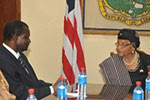 The World Health Organisation (WHO) said the spread of the Ebola virus appears to be stabilising in Guinea and in Liberia, but Sierra Leone is still struggling to bring the epidemic under control. "In the three countries with widespread and intense transmission, reported case incidence is no longer increasing nationally in Guinea and Liberia, but is still increasing in Sierra Leone," the WHO said in an update issued on 19 November. The agency stressed that there are still pockets of intense transmission in Guinea and Liberia, and the confirmation of new cases in Mali is further proof that the outbreak is far from over. Mali has reported six cases of Ebola virus, five of them were fatal. "With adequate levels of preparation, however, such introductions of the disease can be contained before they develop into large outbreaks," it said. The UN and partner organisations deployed preparedness teams to countries neighbouring the main outbreak area to help strengthen their existing response plans. Meanwhile about 150 health workers from six West African countries completed a weeklong training in Accra in preparation to join efforts to contain the outbreak in the most affected countries. The training is part of a joint ECOWAS-AU initiative managed by the West African Health Organisation (WAHO). ECOWAS Commission President Kadré Désiré Ouédraogo visited Guinea, Liberia and Sierra Leone to carry a message of solidarity from the sub-region. He also committed an additional USD 1 million in funding to combat the virus in each of the three countries.
The World Health Organisation (WHO) said the spread of the Ebola virus appears to be stabilising in Guinea and in Liberia, but Sierra Leone is still struggling to bring the epidemic under control. "In the three countries with widespread and intense transmission, reported case incidence is no longer increasing nationally in Guinea and Liberia, but is still increasing in Sierra Leone," the WHO said in an update issued on 19 November. The agency stressed that there are still pockets of intense transmission in Guinea and Liberia, and the confirmation of new cases in Mali is further proof that the outbreak is far from over. Mali has reported six cases of Ebola virus, five of them were fatal. "With adequate levels of preparation, however, such introductions of the disease can be contained before they develop into large outbreaks," it said. The UN and partner organisations deployed preparedness teams to countries neighbouring the main outbreak area to help strengthen their existing response plans. Meanwhile about 150 health workers from six West African countries completed a weeklong training in Accra in preparation to join efforts to contain the outbreak in the most affected countries. The training is part of a joint ECOWAS-AU initiative managed by the West African Health Organisation (WAHO). ECOWAS Commission President Kadré Désiré Ouédraogo visited Guinea, Liberia and Sierra Leone to carry a message of solidarity from the sub-region. He also committed an additional USD 1 million in funding to combat the virus in each of the three countries.
Article in English: http://www.un.org/apps/news/story.asp?NewsID=49387
Article in English: http://www.thenewdawnliberia.com/ecowas-pays-solidarity-visit
Article in French: http://www.un.org/33775#.VHJFQUtHHLQ
RPCA: Food security experts forecast above average grains production in 2014-15
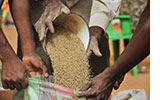 The West African cereal production is projected to reach 48.5 million tonnes (data for Niger and Mali is not yet included), a 4% increase over the previous year and 8% higher than the average over the last five years. Nevertheless, the nutrition situation remains alarming, notably in the Sahel. According to the results of the June-July and August-September 2014 surveys, the global acute malnutrition rate reached a level above the warning threshold (10%) in 26 areas or regions (Chad, Mali, Mauritania, Niger and Senegal), and a level above the emergency threshold (15%) in six localities (Chad, Mauritania, Niger and Senegal). A consensual map illustrating different levels of food insecurity by area, has been prepared and will be published shortly. Experts from the regional system for the prevention of food crises (PREGEC) issued this forecast during a technical consultation to validate projections for the 2014-15 crop year and review the results from 2013-14. Held from 18-20 in Dakar, the meeting brought together representatives from agricultural statistics departments in CILSS, UEMOA and ECOWAS member countries as well as experts from regional food security information and early warning systems in preparation for the next Food Crisis Prevention Network (RPCA) meeting scheduled on 17-18 December in Brussels. The meeting is part of the PREGEC cycle pursued by RPCA Members to continuously monitor the crop and food situation in the sub-region on the basis of a Harmonised Framework using the same indicators in each country. Drawing on this consensual analysis, Network Members make recommendations for decision-makers to prevent and timely respond to potential food crises. Participants urged national governments, regional institutions and partner organisations to quickly develop assistance plan to populations in food and nutritional insecurity. They also launched a call for solidarity to effectively eradicate the Ebola epidemic and limit its impact on the food and nutritional situation of vulnerable households.
The West African cereal production is projected to reach 48.5 million tonnes (data for Niger and Mali is not yet included), a 4% increase over the previous year and 8% higher than the average over the last five years. Nevertheless, the nutrition situation remains alarming, notably in the Sahel. According to the results of the June-July and August-September 2014 surveys, the global acute malnutrition rate reached a level above the warning threshold (10%) in 26 areas or regions (Chad, Mali, Mauritania, Niger and Senegal), and a level above the emergency threshold (15%) in six localities (Chad, Mauritania, Niger and Senegal). A consensual map illustrating different levels of food insecurity by area, has been prepared and will be published shortly. Experts from the regional system for the prevention of food crises (PREGEC) issued this forecast during a technical consultation to validate projections for the 2014-15 crop year and review the results from 2013-14. Held from 18-20 in Dakar, the meeting brought together representatives from agricultural statistics departments in CILSS, UEMOA and ECOWAS member countries as well as experts from regional food security information and early warning systems in preparation for the next Food Crisis Prevention Network (RPCA) meeting scheduled on 17-18 December in Brussels. The meeting is part of the PREGEC cycle pursued by RPCA Members to continuously monitor the crop and food situation in the sub-region on the basis of a Harmonised Framework using the same indicators in each country. Drawing on this consensual analysis, Network Members make recommendations for decision-makers to prevent and timely respond to potential food crises. Participants urged national governments, regional institutions and partner organisations to quickly develop assistance plan to populations in food and nutritional insecurity. They also launched a call for solidarity to effectively eradicate the Ebola epidemic and limit its impact on the food and nutritional situation of vulnerable households.
Advisory in English: http://cilss.bf/PREGEC-Nov2014__EN_docx.pdf
Advisory in French: http://cilss.bf/PREGEC_Dakar_novembre2014_VF.pdf
Mali: Third round of peace talks opens in Algeria
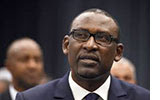 The Malian government called for the swift conclusion of an agreement as it began a third round of peace talks with northern militants groups. The talks resumed on 20 November in Algiers, under the mediation of Algerian Foreign Minister Ramtane Lamamra. "We need to quickly reach a solid agreement," Malian Foreign Minister Abdoulaye Diop told APS, the Algerian state news agency. "We are well aware of the difficulties we face on this route, and one of those is the situation on the ground." Violence has continued in the Kidal region even as the parties have expressed commitment to the negotiation process. Both sides accuse the other of violating a ceasefire agreed in May. The distrust between the two sides is one of the obstacles to reaching a final peace agreement to end decades of uprisings in northern Mali, where Touareg and Arab groups had declared an independent state of Azawad before agreeing to come to the negotiating table. "We reaffirm our will to achieve a peace that meets the aspirations of Azawad population. But we do not want a peace that comes at any price," militant leader Amiri Ag Aissasaid told the Reuters news agency.
The Malian government called for the swift conclusion of an agreement as it began a third round of peace talks with northern militants groups. The talks resumed on 20 November in Algiers, under the mediation of Algerian Foreign Minister Ramtane Lamamra. "We need to quickly reach a solid agreement," Malian Foreign Minister Abdoulaye Diop told APS, the Algerian state news agency. "We are well aware of the difficulties we face on this route, and one of those is the situation on the ground." Violence has continued in the Kidal region even as the parties have expressed commitment to the negotiation process. Both sides accuse the other of violating a ceasefire agreed in May. The distrust between the two sides is one of the obstacles to reaching a final peace agreement to end decades of uprisings in northern Mali, where Touareg and Arab groups had declared an independent state of Azawad before agreeing to come to the negotiating table. "We reaffirm our will to achieve a peace that meets the aspirations of Azawad population. But we do not want a peace that comes at any price," militant leader Amiri Ag Aissasaid told the Reuters news agency.
Article in English: http://www.reuters.com/mali-talks-0J429I20141120
Article in French: http://fr.allafrica.com/stories/201411230539.html
ECOWAS and UEMOA review progress on institutional co-operation
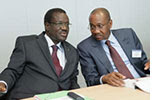 Experts from ECOWAS and UEMOA are meeting to discuss issues of convergence and to review progress in the implementation of joint programmes. The 13th inter-agency consultations are taking place from 20-26 November in Abuja under the co-chairmanship of ECOWAS Commission President Kadré Désiré Ouédraogo and UEMOA Commission President Cheikhe Hadjibou Soumaré. The biennial meetings give the leaders of the two regional organisations a chance to compare notes on matters related to integration in order to strengthen the co-ordination of action between the two institutions. The introduction of the Common External Tariff (CET) for the ECOWAS region is topping the agenda. The UEMOA and ECOWAS commissioners responsible for convergence will examine the implementation of the roadmap for the CET, which is scheduled to enter into force on 1 January 2015. Participants will also discuss the establishment of an institutional mechanism for monitoring the implementation of the Economic Partnership Agreement (EPA) with the EU and the related EPA Development Programme. Authorities will also co-ordinate actions in sectoral programmes, particularly in the areas of infrastructure, agriculture, environment and energy.
Experts from ECOWAS and UEMOA are meeting to discuss issues of convergence and to review progress in the implementation of joint programmes. The 13th inter-agency consultations are taking place from 20-26 November in Abuja under the co-chairmanship of ECOWAS Commission President Kadré Désiré Ouédraogo and UEMOA Commission President Cheikhe Hadjibou Soumaré. The biennial meetings give the leaders of the two regional organisations a chance to compare notes on matters related to integration in order to strengthen the co-ordination of action between the two institutions. The introduction of the Common External Tariff (CET) for the ECOWAS region is topping the agenda. The UEMOA and ECOWAS commissioners responsible for convergence will examine the implementation of the roadmap for the CET, which is scheduled to enter into force on 1 January 2015. Participants will also discuss the establishment of an institutional mechanism for monitoring the implementation of the Economic Partnership Agreement (EPA) with the EU and the related EPA Development Programme. Authorities will also co-ordinate actions in sectoral programmes, particularly in the areas of infrastructure, agriculture, environment and energy.
Article in English: http://en.starafrica.com/meetings-of-ecowas-uemoa.html
Article in French: http://news.ecowas.int/php?nb=214&lang=fr&annee=2014
Contact Group urges strong international support for Guinea-Bissau
The International Contact Group on Guinea Bissau (ICG-GB) called on the international community to offer maximum support to entrench democracy in Guinea-Bissau. The ICG-GB adopted a communiqué to that effect at its 10thworking session, held on 18 November at the UN headquarters in New York. Guinea-Bissau Prime Minster Domingos Simoes Pereira briefed the participants on conditions in the country and the challenges his government faces. With elections held in April and May, Guinea-Bissau has completed the transition to democratic rule following the April 2012 military coup. The Contact Group said the successful transition offers an opportunity for the country to break with its history of political instability. The communiqué commended the contributions made by the ECOWAS Mission in Guinea-Bissau (ECOMIB), which provided security for the elections and is leading a critical security sector reform programme. It strongly endorsed the extension of the mandate of ECOMIB as Guinea-Bissau pursues further reforms to strengthen institutions to uphold the rule of law and build confidence among international partners and potential investors. Participants also stressed the importance of effective co-ordination between international interventions to support political stability and economic recovery in Guinea-Bissau. The UN Security Council endorsed the recommendations of the Contact Group. A donor conference for Guinea-Bissau is scheduled for January 2015.
Article in English: http://www.modernghana.com/communiqu-bissau.html
Article in French: http://fr.starafrica.com/bissau-internationale-selon-lonu.html
ECOWAS/RAAF seeks proposals for social safety net study
 The ECOWAS Regional Agency for Agriculture and Food (RAAF), with the financial support of the French Development Agency (AFD), is commissioning a study on "Support to the design of a regional exchange and learning platform on Social Safety Nets (SSN) in West Africa". To that end, the RAAF has issued a Call for Expressions of Interest (CET) from international Technical Consultancy Firms (TCF). From among the initial applicants, ECOWAS will shortlist about six firms, which will then be invited to submit proposals for the provision of the required services. Information regarding the CEI is available in English and in French. The deadline for submission is 5 December 2014.
The ECOWAS Regional Agency for Agriculture and Food (RAAF), with the financial support of the French Development Agency (AFD), is commissioning a study on "Support to the design of a regional exchange and learning platform on Social Safety Nets (SSN) in West Africa". To that end, the RAAF has issued a Call for Expressions of Interest (CET) from international Technical Consultancy Firms (TCF). From among the initial applicants, ECOWAS will shortlist about six firms, which will then be invited to submit proposals for the provision of the required services. Information regarding the CEI is available in English and in French. The deadline for submission is 5 December 2014.
CIE in English: http://www.araa-raaf.org/filets_securite_sociaux_FR.doc
CIE in French: http://www.araa-raaf.org/filets_securite_sociaux_EN.doc
| Attachment | Size |
|---|---|
| 191SWACNewsBrief18-24nov2014_en.pdf | 1.11 MB |
